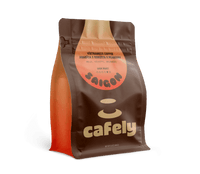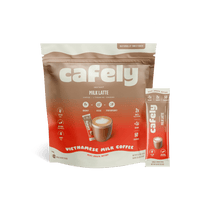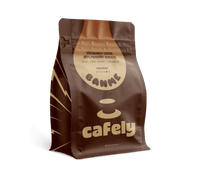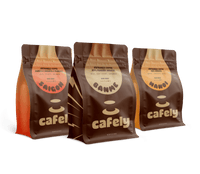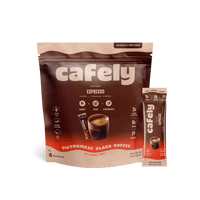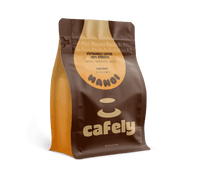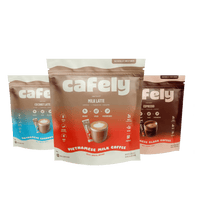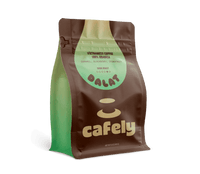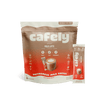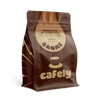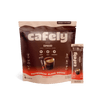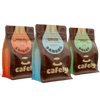Some days feel heavier than they should, and when time’s tight, self-care becomes a thought you push to the back. But there’s good news — your brain doesn’t need much to change course and improve your mood.
In ten minutes or less, you can trick your mood into loosening its grip. You won’t need a complete life overhaul or a therapy couch. Just quick, low-effort mood resets that will help flip the switch to a happier life.
Why Mood Matters & How It Works
Your mood shapes how you think, connect, move, and react. When your mood is low, everything feels heavier — small tasks become burdens, decision-making starts to fog, and social cues feel off.
A positive mood, on the other hand, can improve your focus and motivation, helping your brain respond flexibly to challenges.
At a biological level, mood is tied to neurotransmitters — chemical messengers like serotonin, dopamine, and GABA that influence your emotional tone and energy. These messengers respond to everything from what you eat to how much natural light you get.
They’re also surprisingly responsive to small changes. That’s why even a few minutes of intentional actions, like a ten-minute routine, can shift your mood in a better direction, improving the rest of your day.
Mood Booster Toolkit: A 10-Minute Routine You Can Try Right Now
Sometimes, you need a reset button to get your life back on track. This compact, science-backed routine blends breathing, movement, sensory cues, and a bit of brain chemistry to lift your mood naturally. Each piece plays a role, and all you need is ten minutes and a little intention.
Try it once, tweak it to fit your style, and keep it in your back pocket for the days that feel heavier than they should.
Minute 1 to 2: Breathwork
Start simple — breathe. Use the box breathing method — inhale for four seconds, hold for four, exhale for four, and hold again. Do that cycle for two minutes.
Why it works: This pattern signals safety to your nervous system. It slows your heart rate, tames cortisol, and gives your body a chance to shift from stress mode to relaxation.
Minute 3 to 4: Movement
After your breathing exercise, it’s time to get your blood moving. You don’t need to do a HIIT workout. Just take a brisk walk around the room, do a few easy stretches, or dance to your favorite high-energy song.
Why it works: Movement lights up your brain's reward system, sending dopamine and endorphins into action. Even a few minutes can sharpen your focus and snap you out of a funk.
Minute 5 to 6: Sensory Reset
Consider your main senses like smelling, tasting, and feeling, and try something to change it up. You can light a scented candle or dab some essential oils, or you can make a quick cup of herbal tea and hold the warm mug in your hand to hit multiple senses.
Why it works: What your senses are picking up affects your mood. A pleasant scent or warm drink grounds you in the present moment, moving your buddy into calm without needing to think about it.
Minute 7 to 8: Gratitude or Joy Journaling
Grab a pen or open a notes app and jot down one thing you’re grateful for and one moment recently that made you smile. Yes, it sounds cheesy, but you don’t have to elaborate or go into full paragraphs.
Why it works: This small reflection pulls your attention toward what’s working, distracting you from what was stressing you out. It’s a low-effort way to train your brain for optimism.
Minute 9 to 10: Supplement or Adaptogen (Optional)

If it fits your routine, this is the moment to sip your tea with a natural booster. Ashwagandha, L-theanine, or a dose of magnesium can support stress recovery and smooth out lingering tension.
Why it works: Paired with breath, movement, and mindful reflection, these supplements can help round out the effects. Depending on the adaptogen you choose, they can help calm your nerves or sharpen your mental edge.
15 Mood-Boosting Habits You Can Do in Under 10 Minutes
When you’re crunched for time or need a quick mood lift, these bite-sized habits can slip right into your day without disrupting it. These are low-effort, high-return actions. Try one, mix a few, or rotate them based on your mood.
1. Take a Brisk Walk Outdoors
Get your legs moving and face the sun, even just for five minutes. You’re stretching your limbs and soaking up Vitamin D, waking up your circulation. Physical activity paired with sunlight helps your body release dopamine and serotonin, the kind of chemical combination your brain loves.
2. Practice Gratitude Journaling
Take an extended version of the gratitude earlier, jotting down a few things you’re genuinely thankful for on whatever paper or digital notepad you have. This could be anything, like a good cup of morning coffee or a friend who texted you out of nowhere.
Gratitude helps move your brain out of scarcity mode, a state where your brain becomes overly focused on what you lack (time, money, love, energy, success). You’ll move into something softer and more open.
3. Deep Breathing or Box Breathing
Do you have a few minutes between meetings or after lunch break? A few minutes of deliberate box breathing reins in the fight-or-flight response. You can even do it at a traffic light or while you’re waiting for your Teams meeting to load.
4. Drink a Glass of Lemon Water
When you’re dragging, it might just be dehydration. A full glass of cold water with a squeeze of lemon perks your brain (and taste buds) up. You’re hydrating cells, flushing out brain fog, and kicking your metabolism back into gear.
5. Stretch or Try a Quick Yoga Pose
Roll your shoulders, touch your toes, do a standing twist; these small moments melt tension and send your nervous system signals of safety. Plus, it gets your blood pumping a bit more and helps you avoid the back and neck cramps from sitting at a desk for too long.
6. Call or Text a Friend
Constantly scrolling through social media may actually make you feel lonelier. Scroll past the noise and message someone who makes you feel like yourself. Even a quick “thinking of you” text or a funny meme sent at the right moment can be enough.
Social connection is a biological need. Even brief contact helps lower cortisol, your stress hormone, and sparks oxytocin, the chemical that fuels trust, belonging, and emotional safety. Your brain reads that connection like a signal telling you you’re not alone in this.
7. Laugh (Watch a Funny Clip)
Rewatch a video that makes you laugh every time. Laughter, even if you have to fake it at first, hijacks stress chemistry. Your body doesn’t care if it’s a real belly laugh or a snort — endorphins get released either way.
8. Listen to Uplifting Music

Choose music that makes your shoulders bounce and your head nod without thinking about it. Music changes your brainwaves and emotional tone in minutes, so put on that 2000s pop song you secretly love (but won’t tell your friends about) and enjoy.
9. Do a One-Minute Meditation
Sit still, close your eyes, and breathe without trying to fix or change anything for sixty seconds. Don’t worry if your mind wanders because it will. The point is to create a moment of stillness in a day that probably has very little. One intentional minute can give your brain a chance to hit pause and catch up on some mental clarity.
10. Declutter One Small Space
You only need to clear off one surface, like your desk, nightstand, or drawer. There’s something oddly satisfying about creating visible order. Actually, it can trick your mind into feeling like other things are more manageable, too. Physical chaos and mental chaos often go hand in hand. Cut one, and the other tends to follow.
11. Visualize a Positive Goal or Memory
Remember Happy Gilmore’s “happy place,” with his grandma in a Kiss shirt, the bad guy getting his comeuppance, and Happy getting the girl? Beyond the comedic aspects, it’s a perfect example of visualization at work.
Your brain isn’t great at distinguishing between what’s imagined and what’s real, so this mental exercise lights up the same reward pathways as the experience. Find your version of the “happy place,” and watch your mood completely change.
12. Engage Your Senses (Aromatherapy, Warm Drink)
Sometimes, your brain needs to stop thinking and start feeling. Brew peppermint tea or splash cool water on your face. These small sensory inputs ground you in the present moment, which is exactly where your nervous system wants you to be when it's trying to settle down.
13. Do a Creative Micro-Task (Sketch, Doodle, Note Ideas)
Any sliver of creative action activates the reward centers of your brain, especially if you're doing it for no one but yourself. You don't have to be an artist — just doodle something out or jot down a business idea.
14. Chew Gum or Suck on a Mint
Chewing gum or a mint stimulates your brain just enough to lift alertness and reduce stress. The repetitive motion also sends a message to your body that you're safe, which shuts down anxiety's internal sirens. It's a simple but weirdly effective biohack.
15. Use a Cold Splash or Ice Roll on the Face

It might make you wince, but a burst of cold water or a quick ice roll across your cheeks can jolt your parasympathetic nervous system into gear. This is the same system that tells your body, “We’re okay now. You can relax.” It’s fast, physical, and calming once the shock wears off.
Adaptogens & Supplements to Support Mood-Boosting Habits
So, you’ve tried to implement the habits above, but you aren’t noticing the effects as much as you’d like. You may want to look into natural tools like adaptogens as gentle amplifiers. These supplements work with your body’s existing systems to help you recover from stress, stay grounded, or find mental clarity.
Each one pairs best with certain habits, and the synergy between the two can make your 10-minute mood boosts even more effective.
Here are six supplements that may help boost your mood:
1. Ashwagandha
An earthy root used in Ayurvedic medicine for centuries, ashwagandha is one of the most popular adaptogens for stress support. It’s known for its ability to calm the nervous system without totally knocking you out.
- When to use it — Best after grounding practices like breathwork or journaling, when your system is already in "exhale" mode.
- How it helps — This root helps reduce cortisol, the hormone your body pumps out under stress [1]. Less cortisol means fewer anxious spirals and more emotional stability.
- Caution — Before starting this adaptogen, it can cause drowsiness, especially midday, and may interfere with thyroid medications.
2. Rhodiola Rosea
Sourced from cold, mountainous regions like Siberia, Rhodiola rosea is all about improving energy, stamina, and mental sharpness. It’s the adaptogen you use when you have trouble getting motivated or feel sluggish.
- When to use it — This is a strong pick before any energizing habit like walking or dancing.
- How it helps — It supports your body’s stress response while improving focus and mood [2]. Some even report it helps lower fatigue, so you can get through daily functions better. You'll often feel a subtle boost in energy without jitters.
- Caution — You’ll want to start slow. If you’re sensitive, you may feel overstimulated, especially with higher doses.
3. L-Theanine
A compound naturally found in green tea, L-theanine, is known for creating calm without sedation. It takes the edge off without making your thoughts feel fuzzy — a rare and valuable balance.
- When to use it — It pairs well with calming rituals like music, tea sipping, or breath-based meditation.
- How it helps — L-theanine boosts alpha brain waves, which are associated with creativity, flow, and relaxed focus [3]. It’s a great tool for reducing mental noise without slowing you down.
- Caution — Can cause sedation in high doses.
4. Magnesium
This mineral plays a central role in how your body handles stress. Most people don’t get enough of it, and low levels have been linked to anxiety, irritability, and poor sleep.
- When to use it — Best used in the evening after yoga, in a bath, or as a part of your nighttime wind-down.
- How it helps — Magnesium relaxes the muscles and eases mental tension, reducing anxiety and promoting sleep. It also helps balance neurotransmitters like GABA, calming the nervous system [4].
- Caution — Overdoing it, especially with forms like magnesium citrate, can cause digestive upset. Magnesium glycinate or malate is gentle, but if you’re new to it, start low and monitor how your body reacts.
5. B-Complex Vitamins

As a group of vitamins (including B6, B12, thiamine, riboflavin, folate, and others), this package keeps your brain running smoothly. They support everything from mood regulation to nervous system health. But when you’re short on them, you’ll feel brain fog, mood swings, or a wired-tired crash in the afternoon.
- When to use it — Adding B-vitamins to your morning routine before starting a creative project like journaling or goal-setting is a smart way to incorporate these supplements.
- How it helps — Crucial for neurotransmitter production that is tied to mood, motivation, and mental resilience. Neurotransmitters carry signals between nerve cells to tell your body when to calm down, get motivated, or rest. B-vitamins help synthesize things like serotonin, dopamine, and GABA to regulate your mood and energy levels [5].
- Caution — Take with food to avoid nausea, and be mindful of your total intake if you’re already using a multivitamin.
6. Omega-3 (EPA/DHA)
Most commonly sourced from fish oil or algae, omega-3 is an essential fatty acid. They’re some of the most well-studied nutrients for mood, and, over consistent use, they can help your emotional highs and lows a bit more level.
- When to use it: Omega-3 supplements are a long-term approach to emotional support. They’re great to pair with creative or reflective habits like journaling.
- How it helps: These supplements reduce systemic inflammation, which is often linked to mood instability [6]. They also support healthy brain cell function, making emotional regulation a little easier.
- Caution: May thin blood in high doses.
Best 5 Foods That Can Improve Your Mood Fast
When your mood needs a lift, certain foods can act fast on brain chemistry. Some reduce inflammation, boost neurotransmitters, and support gut-brain communication.
Here are five that science says pack the biggest punch:
1. Dark Chocolate (70% Cocoa or Higher)
Outside of just being delicious, dark chocolate is loaded with flavonoids (antioxidants), polyphenols, and a caffeine-theobromine combo. These bioactive compounds improve blood flow to the brain, reduce inflammation in your body, and promote feel-good neurotransmitters like serotonin [7].
A small serving of one or two squares can improve mood and mental clarity.
2. Fermented Foods
Yogurt, kimchi, and kefir may be trendy, but they’re great brain boosters, too. These fermented staples are full of live probiotics that interact with your gut lining, influencing neurotransmitters like GABA and serotonin through the gut-brain axis.
Researchers have found that those who eat probiotic-rich food frequently have less social anxiety, depressive symptoms, and neuroticism [8]. When your gut is full of microbes, your brain tends to be calmer, more resilient, and less reactive to stress.
3. Fatty Fish
If you want to skip the omega-3 supplements, having a diet full of fatty fish like salmon, mackerel, and sardines gives you the same benefits. These healthy fats become part of your brain cell membranes, helping your neurons communicate more efficiently. They may also help reduce chronic inflammation, which is often linked to mood disorders like depression.
In large-scale reviews of studies, researchers found that people who regularly take omega-3s (through their diet or supplements) tend to have lower rates of depression [9]. So, on top of the protein from fatty fish, you’re also feeding your brain raw materials it needs to function better.
4. Green Tea

Sipping green tea is an easy way to get your L-theanine, the calming amino acid that helps boost your attention and working memory. Plus, this beverage has a healthy amount of caffeine, keeping you alert without unwanted jitters.
5. Bananas
Bananas are full of beneficial vitamins and carbohydrates. Their B6 vitamins help your body create serotonin and dopamine, the main mood-regulating neurotransmitters [5]. Plus, their natural sugars and fiber deliver steady energy that keeps mood dips at bay. If you’re feeling a slump, a banana can be a fast way to stabilize your mood and fuel your body.
Habits That Might Sour Your Mood
Just as certain behaviors can lift your spirits, others quietly drag them down. Sometimes it’s not obvious — a few daily patterns that seem harmless until you notice a brain fog that won’t lift.
Here are five sneaky mood-sinkers worth watching out for:
- Endless social media scrolling — Mindlessly scrolling social media might feel like a quick break, but it can chip away at your mental clarity. The constant flood of curated lives and hot takes can heighten anxiety, feed comparison loops, and leave you feeling more isolated.
- Skipping meals or eating ultra-processed foods— Eating unhealthy foods or skipping meals altogether can cause your blood sugar to swing wildly. That crash you feel mid-afternoon means your brain is running low on fuel. Processed snacks may offer temporary comfort, but they often lead to irritability, sluggishness, and cravings that cycle back around.
- Isolating or avoiding contact— Avoiding people when you’re feeling off might seem like the best for your self-preservation, but isolation tends to backfire. The more you retreat, the more room your brain has to ruminate and spiral. Connections can interrupt that loop and bring perspective when your mind starts tightening in on itself.
- Excess caffeine or alcohol— Caffeine and alcohol are both double-edged swords. A morning coffee or evening glass of wine can boost your mood in the moment, but too much of either is bad. They can disrupt your sleep, spike stress hormones, or leave your nervous system ragged.
- Overconsumption of negative news— If you’re constantly plugged into the news cycle, your brain is likely swimming in cortisol. While staying informed is important, overconsumption of negative headlines can train your nervous system to stay on high alert, increasing feelings of fear and pessimism that bleed into your day.
When to See a Doctor
When mood dips, stop being temporary and start affecting your daily life — it's time to check in with a professional.
Here are some signs it’s worth talking to a doctor or mental health provider:
- Persistent low mood for two or more weeks.
- Losing interest in things you usually enjoy or noticing big changes in appetite or sleep.
- Persistent thoughts of hopelessness, worthlessness, or self-harm.
- Unexplained physical symptoms, like chronic fatigue or body aches.
- A family history of depression or anxiety disorders.
FAQs: Mood Boosting Habits
Here are the most common questions people have about fast, natural ways to lift their mood.
1. Can You Really Boost Your Mood in 10 Minutes?
Yes, your brain chemistry is more flexible than you think. Just a few minutes of intentional breathing, movement, or laughter can shift neurotransmitter activity and calm your nervous system almost immediately.
2. What Is the Fastest Way to Lift My Mood Naturally?
Step outside and move your body, ideally in sunlight. A brisk walk paired with deep breathing often delivers a fast and lasting emotional reset.
3. Are Adaptogens Safe to Take Every Day?
In most cases, yes. But it depends on the herb, your dosage, and your individual health. If you’re pregnant, on medication, or managing a condition, check with a healthcare provider first.
4. What Causes Sudden Mood Dips?
Mood crashes often come from blood sugar fluctuations, dehydration, poor sleep, or underlying stress. It’s your body’s way of asking for more balance, even if it comes across as irritability or sadness.
5. Can Diet Affect My Mood?
Absolutely. Foods rich in B vitamins, omega-3s, fiber, and antioxidants support brain health and neurotransmitter production. What you eat directly impacts your energy, clarity, and emotional stability.
6. Is It Okay to Use Supplements Instead of Habits?
Supplements can help, but they work best as a support, not a replacement. Habits like movement, breathwork, and rest build long-term resilience that no capsule can mimic.
7. How Do I Stay Consistent With These Habits?
Link them to something you already do, like brushing your teeth or journaling with your morning coffee. Small routines are easier to maintain when they’re part of something familiar.
8. What Are Signs a Mood Booster Isn’t Working?
If you notice heightened anxiety, drowsiness, irritability, or no changes at all, it might not be the right fit. Everyone responds differently, so don’t be afraid to adjust or switch it up.
9. Are There Any Natural Dopamine Boosters?
Yes, tyrosine-rich foods like eggs and nuts, Rhodiola rosea, music you love, new experiences, and exercise all help increase dopamine naturally and safely.
References:
- U.S. Department of Health and Human Services. (n.d.-a). Office of dietary supplements - ashwagandha: Is it helpful for stress, anxiety, or sleep?. NIH Office of Dietary Supplements.
- Ivanova Stojcheva E, Quintela JC. The Effectiveness of Rhodiola rosea L. Preparations in Alleviating Various Aspects of Life-Stress Symptoms and Stress-Induced Conditions-Encouraging Clinical Evidence. Molecules. 2022 Jun 17;27(12):3902. doi: 10.3390/molecules27123902. PMID: 35745023; PMCID: PMC9228580.
- Evans M, McDonald AC, Xiong L, Crowley DC, Guthrie N. A Randomized, Triple-Blind, Placebo-Controlled, Crossover Study to Investigate the Efficacy of a Single Dose of AlphaWave® L-Theanine on Stress in a Healthy Adult Population. Neurol Ther. 2021 Dec;10(2):1061-1078. doi: 10.1007/s40120-021-00284-x. Epub 2021 Sep 25. PMID: 34562208; PMCID: PMC8475422.
- Rawji A, Peltier MR, Mourtzanakis K, Awan S, Rana J, Pothen NJ, Afzal S. Examining the Effects of Supplemental Magnesium on Self-Reported Anxiety and Sleep Quality: A Systematic Review. Cureus. 2024 Apr 29;16(4):e59317. doi: 10.7759/cureus.59317. PMID: 38817505; PMCID: PMC11136869.
- Calderón-Ospina CA, Nava-Mesa MO. B Vitamins in the nervous system: Current knowledge of the biochemical modes of action and synergies of thiamine, pyridoxine, and cobalamin. CNS Neurosci Ther. 2020 Jan;26(1):5-13. doi: 10.1111/cns.13207. Epub 2019 Sep 6. PMID: 31490017; PMCID: PMC6930825.
- Poggioli R, Hirani K, Jogani VG, Ricordi C. Modulation of inflammation and immunity by omega-3 fatty acids: a possible role for prevention and to halt disease progression in autoimmune, viral, and age-related disorders. Eur Rev Med Pharmacol Sci. 2023 Aug;27(15):7380-7400. doi: 10.26355/eurrev_202308_33310. PMID: 37606147.
- Samanta S, Sarkar T, Chakraborty R, Rebezov M, Shariati MA, Thiruvengadam M, Rengasamy KRR. Dark chocolate: An overview of its biological activity, processing, and fortification approaches. Curr Res Food Sci. 2022 Oct 15;5:1916-1943. doi: 10.1016/j.crfs.2022.10.017. PMID: 36300165; PMCID: PMC9589144.
- Hilimire MR, DeVylder JE, Forestell CA. Fermented foods, neuroticism, and social anxiety: An interaction model. Psychiatry Res. 2015 Aug 15;228(2):203-8. doi: 10.1016/j.psychres.2015.04.023. Epub 2015 Apr 28. PMID: 25998000.
- Wani AL, Bhat SA, Ara A. Omega-3 fatty acids and the treatment of depression: a review of scientific evidence. Integr Med Res. 2015 Sep;4(3):132-141. doi: 10.1016/j.imr.2015.07.003. Epub 2015 Jul 15. PMID: 28664119; PMCID: PMC5481805.
